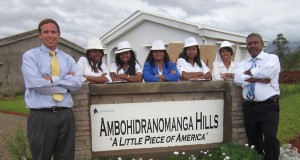BYU’s Ballard Center is the place to be for students who want to change the world for the better.
The Ballard Center is the hub on campus for social innovation. It has many resources for undergraduate and graduate students alike. For instance, it provides a social venture academy for those social entrepreneurs or student teams looking to start a business. It also has courses students can take to put toward a minor, on-campus internships and, if students qualify, it provides grant money to get a social business off the ground.
Alicia Gettys, an MBA student and communication and operations manager for the Ballard Center, said, “The highlight for me is that moment when students find the path that they are passionate about. It’s our objective to connect our students’ skill sets with real-world issues and help guide them through organizations that are actually solving those issues.”

Robert Tonks, an MBA student and VP of navigation for social entrepreneurship, said there are three aspects of the Ballard Center that students should be aware of:
1. Social innovation is the broad term used for addressing social problems through a business-based solution and is one aspect of the Ballard Center. Someone who is looking to start a new business, looking to solve a social issue at its core or trying to create social change falls under this category.
Tonks went on to paraphrase a story about a girl who lives in a very polluted part of Chicago — a neighborhood that was right next to a 1930s coal power plant. The high pollutants in the area have given many of its residents asthma and other respiratory problems.
This girl found success when talking to her youth peers. Her group wanted to make a change, they wanted their voices to be heard, so they shared photos of the pollution on social media. From there they went and talked to the City of Chicago and other nonprofit organizations related with health. After what seemed like a long battle between the coal plant and the residents who surrounded the area, it was decided that the coal plant had a choice to either upgrade its equipment or close its doors.
The girl didn’t start a business, but she did create social change; and that is social innovation.
2. Social intrapreneurship is another aspect of the Ballard Center. It entails working inside of an existing entity to make social change. For example, a big company like Coca-Cola needs to have clean drinking water to sell products. If the world runs out of clean water then Coca-Cola won’t be able to make and sell those products. It has to be concerned about water conservation and purification to continue to make Coca-Cola products.
3. Social entrepreneurship is for those who want to start their own company to push for social change. The Ballard Center offers students the opportunity to guide them through this start-up process. It teaches students how to validate their ideas, access market potential and how to build the company to ultimately help push for this social change, like cleaner water for certain African countries or making a soccer ball that produces electricity for people in the Philippines. The possibilities are endless for anyone, business major or not.
Megan Murff, an MBA student and student director of the Social Venture Academy, said, “Being a social entrepreneur is exciting and a challenge because you are constantly exploring better ways to address the world issues that you care about. In a sustainable and impactful manner … everyone can be a social entrepreneur in their own way.”
Tonks went on to explain that what he loves most about entrepreneurship is taking his skills in architecture and putting them to good use in helping others have homes that meet their needs. More two billion people in the world live on $2 a day or less, and Tonks wants to help empower many of them to live a self-sustainable life.
For more information, visit http://marriottschool.byu.edu/selfreliance/.




